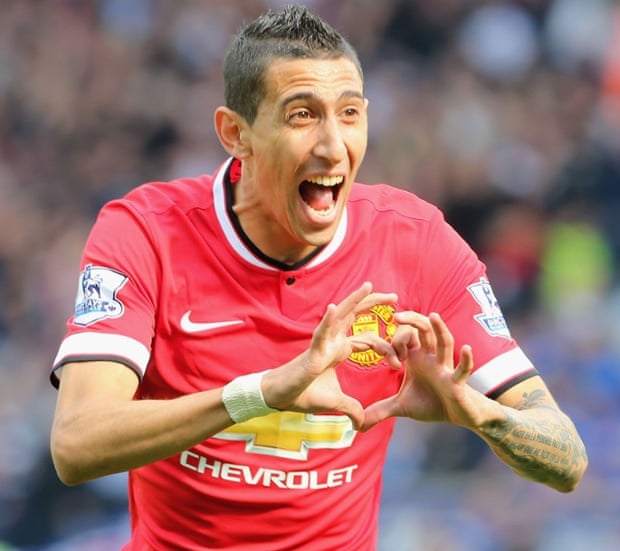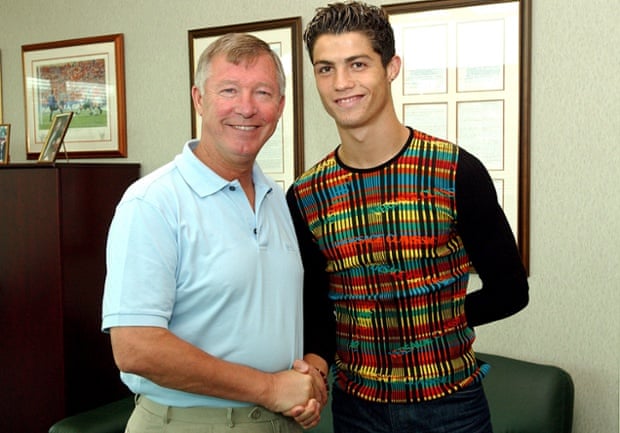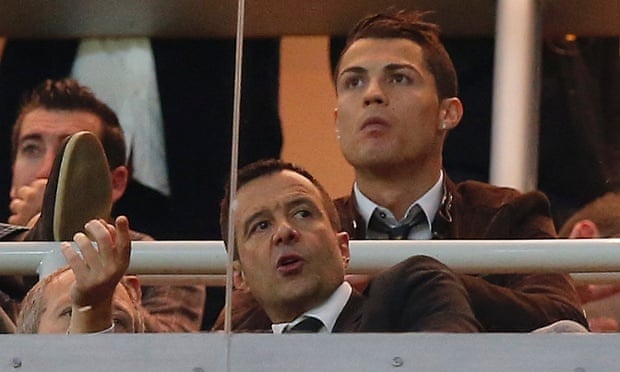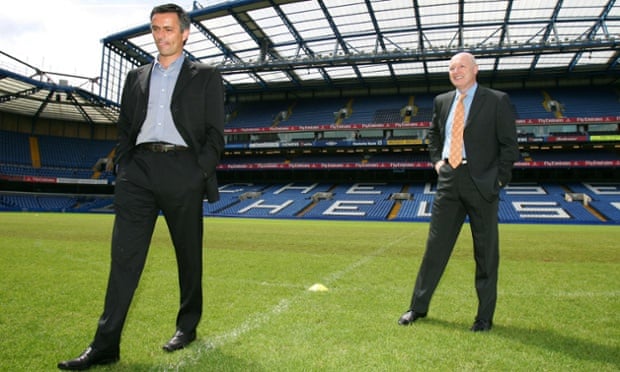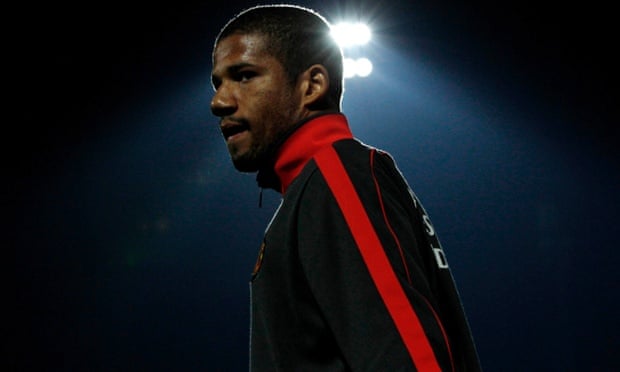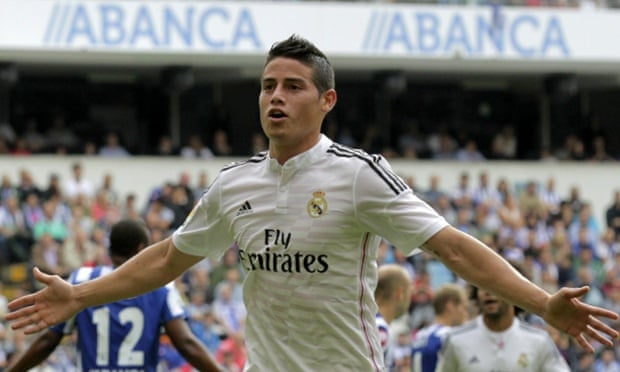 HABERLER & MAKALELER
HABERLER & MAKALELER  Genel
Genel  Diğer Yazarlar
Diğer Yazarlar  Jorge Mendes: the most powerful man in football?
Jorge Mendes: the most powerful man in football?
| Jorge Mendes: the most powerful man in football? |
|
David Conn- 24 September 2014- transfers in European football, is serially involved in the third‑party ownership of players in apparent breach of Fifa regulations, a Guardian investigation can reveal.
Mendes, who brokered the year’s biggest deals, including Ángel di María’s £59.7m move to Manchester United and Diego Costa’s £32m purchase by Chelsea, was seeking to attract €85m (£67m) from undeclared investors via offshore companies to buy stakes in players at clubs in Spain and Portugal, according to a document seen by the Guardian. The prospectus and further inquiries have shown that: • Mendes and the former Manchester United and Chelsea chief executive Peter Kenyon advise five Jersey-based funds on more than £100m to be invested in buying “economic rights” in players. • Mendes admits he has a conflict of interest, because he acts as the agent to players whose economic rights have been bought by the funds he advises; this appears to contravene Fifa regulations on agents. • Sporting Lisbon say the funds that Mendes and Kenyon advise sought to buy stakes in players as a condition of players, advised by Mendes, renewing their contracts. • Mendes claims to have conducted 68% of all player transactions at Portugal’s great clubs, Sporting Lisbon, Benfica and Porto, in the decade 2001-10.
Jorge Mendes. Photograph: Antonio M. Simoes/Atlantico/Press Association Images The 20-year ascent of Mendes from Porto nightclub owner and friend of footballers to the beaming broker of the game’s most lucrative transfers has tracked the sport’s pay-TV-fuelled inflation itself, and Portugal’s status as a habitual exporter of players. Mendes built his name and the operation of his company, Gestifute, on attaining a remarkable dominance over the deals done by Portugal’s top three clubs, and he took several of these players on multimillion-pound moves to England and Spain. There he has extended his influence, particularly after his client José Mourinho made the journey himself from Porto after 2004, to sign as the manager at Chelsea, then Internazionale and Real Madrid, now Chelsea again. Mendes’s work reached stunning fruition this summer, when he was seen conducting the biggest moves of talent and money not only from his home country’s financially hollowed out clubs but of the whole European football player transfer market. James Rodríguez, his reputation glowing from his World Cup excellence, was signed by Real Madrid for £71m from Monaco, to where Mendes brokered his move from Porto only last year for €45m (£38.5m). Porto declared in its annual report that it paid Gestifute €4.4m (£3.6m) for “intermediation service costs” on that deal; the amount paid by Real this year has not been disclosed.
Angel di María moved to Manchester United from Real Madrid for a shade under £60m. Photograph: John Peters/Man Utd via Getty Images Di María, deemed surplus stock at Real Madrid, came to Old Trafford for almost £60m in Manchester United’s post-Sir Alex Ferguson and David Moyes splash-out; a grinning Mendes was seen with Louis van Gaal in the 4x4 at United’s Carrington training ground. Radamel Falcao, whose €40m (£32m) sale by Porto to Atlético Madrid in 2011 was brokered by Mendes – Gestifute shared €3.7m (£3m) “intermediation service costs” with another company, Orel – moved to Monaco last year for £50m, then Mendes brought him to United this summer on an extraordinarily costly loan. Eliaquim Mangala, for whom Manchester City paid £32m to Porto – 33% of Mangala’s “economic rights” had been owned by the Malta-based third-party ownership fund Doyen – was another Mendes move. Costa brought his goalscoring eye from Atlético Madrid, where Mendes boasts of powerful influence, to Mourinho at Chelsea, who paid £32m. Reports have stated that 30% of Costa’s “economic rights” were owned by an offshore fund but sources close to the signing say in fact there was no third‑party ownership of Costa. Unquestionably true, however, is that Mendes, as well as acting as an agent for these and many other players, and being paid by clubs as a transfer “intermediary”, is serially involved with Kenyon in advising on the third‑party ownership of economic rights in players.
The Guardian has seen a document, a prospectus from 2012 seeking to raise €85m (£67m) to buy stakes in footballers via Gibraltar, a tax haven, for a fund named Quality Sports V Investments LP, registered in Jersey, another tax haven. Mendes’s Gestifute agency and Kenyon’s company, Opto, are described as advisers to the fund, helping to identify players, make “partnerships” with “development clubs” in Spain and Portugal, and using their “relationships” with clubs in the “Big 10” – Europe’s and the world’s richest – who will then buy the players. The prospectus boasts of Mendes’s dominance in Portugal, and his and Kenyon’s connections in football, including Mourinho. The document describes the great clubs of Portugal – Porto, Benfica and Sporting Lisbon – the smaller Portuguese club Braga and last season’s La Liga winners and Champions League finalists Atlético Madrid as “partner clubs”. It suggests the fund will do substantial business with them, buying stakes in players who will then be sold on, at a substantial profit to the investors. The standard justification by funds and clubs for third-party ownership, which is condemned by Uefa and banned by the Premier League, is that such funds provide clubs with money they need to buy or keep players. That rationale – which Uefa and the Premier League rejects, arguing that third‑party ownership undermines clubs’ and the game’s financial health and integrity – is not mentioned anywhere in the 225‑page prospectus. It focuses firmly on the money investors can make from a “unique opportunity to invest in football”. With graphs showing the exponential financial growth of the modern transfer market, the prospectus says it is aiming for a startling annual profit: 32%. The fund will “execute the Investment Strategy”, the document promises, through “the expertise of the Investment Advisors, [companies] represented by Peter Kenyon and Jorge Mendes”, who “have extensive experience working within the football industry”. Mendes and Kenyon have “extensive relationships with clubs in the Big 10 that have the financial capacity and incentive to invest in the most talented, high-value football players”. The plan is for the fund to advance the money to an Irish-registered company, Quality Football Ireland IV Limited, which will buy the stakes in players. The document says of Mendes and Kenyon that they have “developed many relationships throughout the football community. By leveraging these relationships, Peter Kenyon and Jorge Mendes have demonstrated a proven track record in brokering football Transfers [sic].” There is no explanation of what is meant by Kenyon and Mendes “leveraging relationships” within football clubs to make transfers happen.
Sir Alex Ferguson greets Cristiano Ronaldo after the Portuguese youngster’s move to Manchester United in 2003. Photograph: John Peters/Man Utd via Getty Images The document makes clear that Mendes remains a players’ agent – stating that he represents “several of the world’s top coaches and footballers”, including Mourinho and Cristiano Ronaldo. Several transfers are cited in evidence for the track record of Mendes and Kenyon, including Ronaldo’s €15m (£12m) move to Manchester United in 2003 from Sporting Lisbon, when Kenyon was United’s chief executive and Mendes was Ronaldo’s agent; and Tiago Mendes’s 2004 move from Benfica to join Mourinho at Chelsea, where Kenyon had moved to become chief executive after Roman Abramovich bought the club in 2003. The document lists four other funds investing in third-party ownership of players which it says Kenyon and Mendes have advised. These are all Jersey-listed partnerships, as outlined by the Guardian earlier this year when we revealed that Chelsea strongly appear to be involved in the third of these funds, Quality Sports III Investments (since renamed Burnaby). Altogether, the four funds have raised £46.8m, have fully spent that money buying player stakes, and “are on track to achieve the target returns”. A report on third-party ownership prepared for Fifa earlier this month by the research organisations Centre de Droit et d’Economie du Sport (CDES) and Centre International d’Etude Du Sport (CIES), which the Guardian has seen, emphasises there is a conflict of interest: where an agent whose prime duty should be to act in the best interests of his client, the player, in fact owns a stake in him and so has a financial interest in having him sold. Third-party ownership, the report concludes, cements a system in which players must be sold before their contracts are served, so that their clubs, and the funds that have advanced the clubs money, can cash in. Some of football’s most powerful agents have become involved in third-party ownership, the researchers found, as a means of extending their influence, and gaining access to more players. The Quality Sports V Investment prospectus deals with Mendes and the question of conflicts of interest. It says: “The Fund is subject to a number of actual and potential conflicts of interest.” These include “inherent conflicts” in the way Gestifute will “provide services” to the fund and to the company investing the money, Quality Football Ireland IV Ltd based in Dublin, and the “services” and “sub‑advisory services” Kenyon’s company Opto will provide to the fund, QFI IV, and Gestifute. Gestifute and Opto “may carry on activities for other investment funds or entities”, with different “investment programmes”, the document says, and “provide advisory services” to other funds established since 2010 which have “equivalent investment objectives” to the fund. “There could be actual or potential conflicts of interest between those funds and [this Quality Sports V Investments] fund,” the prospectus says. Under the general heading “Conflicts of Interest”, the document declares that Mendes will act as the agent for players in whom stakes are bought by the fund. “Jorge Mendes (either directly or through his corporate vehicles) acts or may act as agent for, or otherwise represents or may represent, certain of the Investee Players or potential Investee Players, and may be remunerated independently in that capacity.”
Jorge Mendes, front, watches a Real Madrid game with Cristiano Ronaldo in 2013. Photograph: Helios de la Rubia/Real Madrid via Getty Images This appears to make the world’s most celebrated football intermediary “super‑agent” in breach of Fifa’s agents regulations, which remain in force. Regulation 19.8 states: “Players’ agents shall avoid all conflicts of interest in the course of their activity.” Regulation 29.1 imposes an obligation on clubs not to pay any part of a transfer fee to a player’s agent, and specifically prohibits the agent “owning any interest in any transfer compensation or future transfer value of a player”. Mel Stein, chairman of the Association of Football Agents in England, argues that agents can represent a player and be a broker in his transfer, if efforts are made to avoid a conflict. However, he says: “What is not acceptable is seeking to earn money from both ends of a transfer without ensuring that there is no conflict. I believe that third-party ownership makes that impossible to achieve.” Mendes and Gestifute declined requests for an interview and did not respond to specific questions about his involvement in the third-party ownership funds and the apparent conflict of interest with his duties as an agent. Fifa would not provide an answer to whether an agent such as Mendes, who is also involved in third‑party ownership, is by definition acting in breach of their regulations. A spokeswoman for Fifa said in response to that question: “We cannot provide comments based on a hypothetical situation. The disciplinary committee decides on a matter after analysis of all the specific circumstances pertaining to a case.” World football’s governing body is believed never to have brought any proceedings against any club or person in relation to third-party ownership funds, which clubs are prohibited from allowing to “influence” them, and there is not understood to be any investigation into the activities of Mendes. The prospectus seen by the Guardian illustrates, with coloured pie charts, Mendes’s startling dominance of Portuguese football. Famously, he is always said to have brokered his first significant deal in 1997, the move from Portugal’s Primeira Liga club Vitória Guimarães to Spain’s Deportivo La Coruña for the goalkeeper Nuno Espirito Santo. Mendes, seen smiling by players’ sides ever since, has always been said to have accumulated a huge share of deals, and this document sets it out explicitly, that from 2001-2010, Mendes had “unparalleled success in the Portuguese transfer market”.
José Mourinho is unveiled as Chelsea manager in 2004, with chief executive Peter Kenyon alongside him. Photograph: Tom Jenkins/Guardian Mendes, it says, conducted transfers worth 78% of Sporting Lisbon’s total earnings of €88m (£70m) in that decade. At Benfica, the figure is cited as 51% of €107m (£85m) in transfer deals. Porto exported most of Mourinho’s 2004 Champions League-winning squad – including Paulo Ferreira (£13.2m) and Ricardo Carvalho (£19.85m) – to Chelsea, whom Mourinho had joined as manager with Kenyon as chief executive. Further deals included Pedro Mendes (£2m), who went to Tottenham Hotspur; Deco, sold to Barcelona in a €21m (£17m) swap deal with the midfielder Ricardo Quaresma; then Maniche to Dinamo Moscow and the 31-year-old Nuno Valente, who joined Everton for £1.5m. Mendes is stated to have conducted 70% by value of Porto’s transfers between 2001-10 – €238.4m (£189m) worth of deals, out of €340m (£270m). In total, Mendes is said to have conducted 68% by financial value of all the deals done in the whole decade by Portugal’s top three clubs: €362.2m (£287m) of players sold, out of €535m (£425m) “transactions” concluded in total by the clubs. There are some in Portuguese football who see this dominance by one agent as unhealthy, reflecting concern expressed in the CIES/CDES report to Fifa of the transfer market’s “oligopolisation” by a few powerful intermediaries. Mendes represented or brokered the transfers of most of Portugal’s national team, and acted for Carlos Queiroz, who was the side’s coach from 2008 to 2010.
The Guardian asked Portugal’s football association, the FPF, whether Mendes’s dominance as illustrated by the document and his representation of so many players and coaches gave any cause for concern. A spokesman replied: “The Portuguese FA is not aware of the documents you mention and has no comments to make on this matter.” Sporting Lisbon have recently had plenty of comments to make. The club’s new president, Bruno de Carvalho, has denounced as a “menace” and “monster” the funds to whom majority stakes in almost the club’s entire squad were sold before he was elected in March 2013 and he vowed to end the practice. Sporting’s latest annual report listed eight players, as of 30 June this year, majority or 50% owned by three of the companies in the structure advised by Kenyon and Mendes: Quality Football Ireland; Quality Football Ireland III (in which Chelsea appear to be involved), and Quality Football Fund Ireland. Sporting have told the Guardian that some of these stakes in players were bought by the funds advised by Mendes and Kenyon when the players’ contracts with Sporting were renewed, with Mendes negotiating as their agent. The stakes appeared to De Carvalho’s regime to have been sold as a condition of the players renewing their contracts, which the club argues was a “distortion” and a conflict of interest. A Sporting spokesman, discussing Mendes’s status as an agent and his involvement with third-party ownership funds, said: “This is a situation that Sporting does not agree with. Mainly in situations where the conditions for the renewal of the players’ contracts depended upon the grant from Sporting of those economic rights.” Mendes and Kenyon did not respond to the Guardian’s question about whether economic rights in players were sold to the funds they advise as a condition of a player, represented by Mendes, renewing his contract. However, Sporting said they have been told by the Quality Ireland companies that Mendes does not play a role in their management. Having risen, and moved, with football’s escalation to a business of multibillion-pound money flows and shifting centres of spending, Mendes now bestrides the game, from delivering Di María to a flapping Manchester United, to advising funds buying stakes in Portuguese players he also represents.
Mendes’s first major international deal came in 2002 when he brokered the midfielder Hugo Viana’s transfer from Sporting to Newcastle United, who paid £8.5m for a 19-year-old who would start just 16 Premier League matches for them. Mendes’s break into English football was achieved in partnership with the Manchester‑based agency Formation, who then claimed Mendes broke their agreement when sealing his truly breakthrough deal the following year: Ronaldo’s move from Sporting toUnited. Kenyon then moved to Chelsea, where he and Mendes negotiated Mourinho’s hiring as the new manager, the signings of Carvalho and Ferreira to join him from Porto, and Tiago Mendes, from Benfica. Formation sued in 2005, claiming their agreement required Gestifute to split the agents’ fees from Chelsea, of €2.9m (£2.3m). In 2011 Formation announced they had settled the case, with the payment by Gestifute, net of legal costs, of €205,000 (£163,000). In 2007, Mendes negotiated the £27m purchase by United of Anderson, from Porto, and, for £25.5m from Sporting Lisbon, Nani, whose previous agent, Ana Almeida, complained she had been sidelined. The same summer, Mendes broke through to Real Madrid, when the Spanish giants signed the central defender Pepe for €30m (£24m) from Porto. Mendes’s influence at Real greatly extended when he negotiated Ronaldo’s £80m move from United in 2009, then Mourinho’s arrival as the coach in 2010. Di María, signed from Benfica for £21m, and Carvalho, from Chelsea for £6.7m, were signed immediately, Fábio Coentrão, for £25m from Benfica, the following year, all deals brokered by Mendes.
Bebé with Manchester United in 2010. Photograph: Lee Smith/Action Images In 2010 came his most enduringly curious deal: United’s signing of Bebé, from Vitória Guimarães, for £7.4m. The player, who had a troubled childhood and grew up in care, never played in any club’s academy, unlike Nani, Anderson, Ronaldo and the rest, played in the Homeless World Cup, then scored goals in one season in the Portuguese third division, before playing pre-season friendlies with Guimarães. The club told their members that Mendes bought 30% of Bebé’s economic rights just before the move – rather undermining the argument that the sale of economic rights enables clubs to hold on to players – and, with a 10% agent’s fee, was paid €3.6m (£2.9m) of the £7.4m from United. Gonçalo Reis, Bebé’s agent, complained to the PFP and Fifa that Mendes had poached the player; later Portuguese police announced an investigation into the transfer, but no results of it are known and Mendes has faced no disciplinary charges. Emilio Macedo, the Vitória president, said approvingly of Mendes: “This country owes him a lot because he handles large transfers and brings money into the country. This is like an export.” Bebé, said by United to have been recommended by their scouts in Portugal but never seen by Ferguson, started not a single Premier League match, then was loaned to Besiktas, where several Mendes-represented players have gone, then the Portuguese clubs Rio Ave and Paços Ferreira, before Benfica bought him this summer, spending £2.4m.
Real Madrid’s James Rodríguez arrived from Monaco for £71m. Photograph: Lavandeira Jr/EPA Last year, Mendes was called to help with the new Monaco project financed by the Russian billionaire Dmitry Rybolovlev, and he organised the arrivals of Rodríguez, Falcao, Carvalho, and the midfield force João Moutinho, from Porto. This summer, Rybolovlev decided to restrain his spending and Mendes brokered the sale of Rodríguez to Real Madrid and the loan of Falcao to United on deadline day. Mendes is said now to be involved with the Singapore businessman Peter Lim, who is buying an indebted Valencia. The club’s coach, appointed after two seasons at Rio Ave, is Nuno Espirito Santo, Mendes’s first ever client, back when, a nightclub owner, he ventured into deal-making in the beautiful game. Football has changed vastly since, becoming an industry in which super‑rich Premier League clubs and Spain’s top two are bulk buyers of talent. Mendes, agent, transfer intermediary, adviser to anonymous investors buying stakes in players, “partner” to smaller clubs, “leverager” of relationships in rich ones, has ridden that change. He has made a huge, unthinkable amount of money, and made himself indispensable, too, as an orchestrator, an oiler of the wheels. {jcomments on} http://www.theguardian.com/football/2014/sep/22/-sp-jorge-mendes-agent-third-party-ownership-players
|
Degerli yazarimiz Futbol Ekonomi Site Yetkilisi Perşembe, 22 Eylül 2011.
YAZARIN DIGER YAZILARINI GORMEK ICIN TIKLAYIN
- Premier Lig 2025-26 Sezonu İçin Oyunculara 2.1 Milyar Sterlin Ücret Ödedi (28 Aralık 2025)
- Premier Lig 2025-26 Sezonu İçin Oyunculara 2.1 Milyar Sterlin Ücret Ödedi (28 Aralık 2025)
- Yılın En Fazla Kazanan Futbolcusu 280 Milyon Dolarlık Geliriyle Cristiano Ronaldo Oldu (28 Aralık 2025)
- Yılın En Fazla Kazanan Futbolcusu 280 Milyon Dolarlık Geliriyle Cristiano Ronaldo Oldu (28 Aralık 2025)
- La Liga Medya Gelirlerini 102 Milyon Euro Nasıl Artırdı? (27 Aralık 2025)
- FIFA 2026 Dünya Kupası Biletlerini Satarken, Kârını Maksimize Etme Amacı mı Güttü? (24 Aralık 2025)
- Pegasus Hava Yolları, Chelsea Futbol Kulübü'nün Resmi Havayolu Sponsoru Oldu (24 Aralık 2025)
- 2024-25 Sezonu Kasada ve Sahada Manchester City İçin Kötü Geçti (19 Aralık 2025)
- 2024-25 Sezonu Kasada ve Sahada Manchester City İçin Kötü Geçti (19 Aralık 2025)
- Bir Oyun Değil, Bir Endüstri: Amerika’nın Son Yatırımı Futbol (19 Aralık 2025)
- Championship Ekibi Wrexham'a Neden Para Akıyor? (15 Aralık 2025)
- Futbolda Özel Kredi Borçlanması Artıyor (15 Aralık 2025)
- Futbolda Özel Kredi Borçlanması Artıyor (15 Aralık 2025)
- AC Milan, Inter ve Juventus Finansal Tabloları Karşılaştırması (12 Aralık 2025)
- Yeni Neslin Hızında Koşamayan Futbol, Değişmezse Kaybeder (07 Aralık 2025)
- Milan 2023-24'te Sahada da Kasada da Başarısız Bir Sezon Geçirdi (04 Aralık 2025)
- Milan 2023-24'te Sahada da Kasada da Başarısız Bir Sezon Geçirdi (04 Aralık 2025)
- Real Madrid İçin 2024 Kasada Kazanılan; Sahada İse Kaybedilen Bir Sezon Oldu (04 Aralık 2025)
- Real Madrid İçin 2024 Kasada Kazanılan; Sahada İse Kaybedilen Bir Sezon Oldu (04 Aralık 2025)
- UEFA’nın Finansal Sürdürülebilirlik Kuralları Kulüp Kârlılığını Artırmaya Yardımcı Oluyor mu? (30 Kasım 2025)
- Finansal Fair Play’den Finansal Sürdürülebilirliğe: Andrea Traverso ile Avrupa Futbolunda On Yıllık Reform, Artan Yatırımlar ve Geleceğin Röportajı (30 Kasım 2025)
- Finansal Fair Play’den Finansal Sürdürülebilirliğe: Andrea Traverso ile Avrupa Futbolunda On Yıllık Reform, Artan Yatırımlar ve Geleceğin Röportajı (30 Kasım 2025)
- Fenerbahçe'den % 400 Bedelli Sermaye Artırımı (28 Kasım 2025)
- Fenerbahçe'den % 400 Bedelli Sermaye Artırımı (28 Kasım 2025)
- Altay Neden Yaşamalı? #BaşkaAltayYok (26 Kasım 2025)
- Premier Lig'de Finansal Dönüşüm: PSR'den SCR'ye Geçiş (24 Kasım 2025)
- Premier Lig'de Finansal Dönüşüm: PSR'den SCR'ye Geçiş (24 Kasım 2025)
- Bahis Soruşturmalarında Üç Farklı Dünya: Türkiye, İngiltere ve ABD’de Masumiyet Karinesi (20 Kasım 2025)
- Kadın Futbolunda Yükselen Yönetici Profili: WSL’in Dönüşen Liderlik Yapıları (16 Kasım 2025)
- Güzelliğini Kaybeden Oyun: Bahis Operasyonları Futbolu Nasıl Etkiledi? (14 Kasım 2025)
- Taraftar Deneyimine Göre Spor Stadyumlarının Sıralamasında Dünyanın En İyisi Manchester City'nin Stadı Etihad (12 Kasım 2025)
- Taraftar Deneyimine Göre Spor Stadyumlarının Sıralamasında Dünyanın En İyisi Manchester City'nin Stadı Etihad (12 Kasım 2025)
- Avrupa Futbolunda Devrim mi Geliyor? Real Madrid, UEFA Tekeline Meydan Okuyor (11 Kasım 2025)
- Inter Yeşil Sahalarda Aradığını Bulamasa da, Ekonomik ve Finansal Olarak Başarılı Bir Sezon Geçirdi (10 Kasım 2025)
- Inter Yeşil Sahalarda Aradığını Bulamasa da, Ekonomik ve Finansal Olarak Başarılı Bir Sezon Geçirdi (10 Kasım 2025)
- Bahisçi Hakemler Dosyasındaki Hukuka Aykırılıklar (09 Kasım 2025)
- Bahisçi Hakemler Dosyasındaki Hukuka Aykırılıklar (09 Kasım 2025)
- Real Madrid Avrupa Süper Ligi Nedeniyle UEFA'ya 4,5 Milyar Euroluk Dava Açmaya Hazırlanıyor (06 Kasım 2025)
- Real Madrid Avrupa Süper Ligi Nedeniyle UEFA'ya 4,5 Milyar Euroluk Dava Açmaya Hazırlanıyor (06 Kasım 2025)
- Roman Abramoviç’in Mal Varlığının Dondurulması Sonrasında Chelsea'nin Satışına İlişkin Tartışmalar Devam Ediyor (06 Kasım 2025)
- Roman Abramoviç’in Mal Varlığının Dondurulması Sonrasında Chelsea'nin Satışına İlişkin Tartışmalar Devam Ediyor (06 Kasım 2025)
- Dünyanın En Borçlu Kulübü: FC Barcelona! (05 Kasım 2025)
- Dünyanın En Borçlu Kulübü: FC Barcelona! (05 Kasım 2025)
- Türkiye'de Hakem Skandalı (03 Kasım 2025)
- Beşiktaş'ta Hasan Arat Dönemi İbra Edilmedi (03 Kasım 2025)
- Türk Futbolunda Yasadışı Bahis Soruşturması (31 Ekim 2025)
- 152 Hakeme Bahis Soruşturması (29 Ekim 2025)
- Adaletin Bahsi Olmaz: Hakem Skandalı Futbolun Temelini Sarsıyor (29 Ekim 2025)
- Adaletin Bahsi Olmaz: Hakem Skandalı Futbolun Temelini Sarsıyor (29 Ekim 2025)
- Meşhur “Platini Davası”: Astarı Yüzünden Pahalı! (29 Ekim 2025)
- Futbolda Yeni Arayışlar: Avrupa Yenilik Peşinde, Türkiye Yerinde Sayıyor (24 Ekim 2025)
- Dev Transferlerin Gölgesinde: Transferler Süper Lig’de Taraftara Nasıl Yansıyor? (18 Ekim 2025)
- Barcelona ve Spotify İşbirliği Üzerinden Dinamik Sponsorluk (18 Ekim 2025)
- Barcelona ve Spotify Ortaklığı 2030’a Uzatıldı (18 Ekim 2025)
- Premier Lig Kulüplerine Ücret Tavanı Uygulaması Geliyor (mu?) (17 Ekim 2025)
- Premier Lig Kulüplerine Ücret Tavanı Uygulaması Geliyor (mu?) (17 Ekim 2025)
- Milano'nun Yeni Stadyumu Gelir Potansiyeli, Yatırım Gereksinimleri ve Paylaşım Gerekçeleri İtibariyle Aynı Kentin Takımları İçin Bir Model Olabilir mi? (15 Ekim 2025)
- Milano'nun Yeni Stadyumu Gelir Potansiyeli, Yatırım Gereksinimleri ve Paylaşım Gerekçeleri İtibariyle Aynı Kentin Takımları İçin Bir Model Olabilir mi? (15 Ekim 2025)
- Finansal Fair Play’in Gri Alanı: İmaj Haklarıyla Gizlenen Maaşlar (13 Ekim 2025)
- Avrupa Futbolu Tarihin En Ucuz Likiditesine Ulaştı (11 Ekim 2025)
- Aston Villa'nın Premier Lig'in Kârlılık Ve Sürdürülebilirelik Kurallarıyla Başı Dertte! (04 Ekim 2025)
- Premier Lig'de Genç Oyuncu Gelişimini Piyasa Dinamikleri mi Belirliyor? (03 Ekim 2025)
- Futbolda Sermayenin Artan Kontrolü Oyun Kültürüne Zarar Vermeye Devam Ediyor! (01 Ekim 2025)
- Juventus Gelirlerini Artırıp Zararını Azalttı Ama Kulüpte Hala Finansal Kırılganlık Devam Ediyor! (01 Ekim 2025)
- Juventus Gelirlerini Artırıp Zararını Azalttı Ama Kulüpte Hala Finansal Kırılganlık Devam Ediyor! (01 Ekim 2025)
- Premier Lig'de "6 Büyük" Rekabeti Yeniden Kuruyor! (26 Eylül 2025)
- Manchester United Sadece Sahada Değil, Finansal Olarak ta Mazisini Arıyor! (23 Eylül 2025)
- Avrupa Futbolunun Gizli Patronları CEO'lar (15 Eylül 2025)
- Super Bowl Rövanşı, NFL tarihinin en çok izlenen Maçı Olabilir mi? (14 Eylül 2025)
- Futbol Kulüplerinde Sürdürülebilir Kârlılık Yolları (05 Eylül 2025)
- Futbol Kulüplerinde Sürdürülebilir Kârlılık Yolları (05 Eylül 2025)
- Galatasaray'dan Uğurcan Çakır Transferi İçin Trabzonspor'a Rekor Transfer Ücreti (02 Eylül 2025)
- Fenerbahçe Ederson'a Yıllık 11 Milyon Euro Net Ücret Ödeyecek (02 Eylül 2025)
- Manchester City Önemli Yaptırımlarla Karşı Karşıya!... (01 Eylül 2025)
- Şampiyonlar Ligi, Avrupa Ligi ve Konferans Ligi'nde 2025/26 Sezonu Başlıyor (31 Ağustos 2025)
- Sıradan Bir Kulübün Küresel Bir Kulübe Dönüşümü: Atletico Madrid'in Başarı Öyküsü (30 Ağustos 2025)
- Beşiktaş'ta Beklenen Gerçekleşti ve Ole Gunnar Solskjaer Ayrıldı (30 Ağustos 2025)
- Fenerbahçe Mourinho ile Yollarını Ayırdı! (30 Ağustos 2025)
- Spor Medya Hakları Teknoloji Devlerinin Yeni Oyun Sahasına Dönüştü (29 Ağustos 2025)
- Dört Büyüklerin Kronik Finansal Sorunları (25 Ağustos 2025)
- Dört Büyüklerin Kronik Finansal Sorunları (25 Ağustos 2025)
- Football in Turkey (24 Ağustos 2025)
- İlkelerimizi Kim Yazacak? Cem Can Yazıları (24 Ağustos 2025)
- Fair Play Yemin İstemez Cem Can Yazıları (24 Ağustos 2025)
- Sivas-Kayseri: Türkiye’nin En Büyük Futbol Faciası (24 Ağustos 2025)
- Spor Teknolojileri (24 Ağustos 2025)
- Futbolda Özerkliğin Ekonomisi (24 Ağustos 2025)
- Futbolda ve Basketbolda Güç Simsarlığına Dönüşen Menejerlik (24 Ağustos 2025)
- Türkiye'de Futbol Fanatizmi ve Medya İlişkisi (24 Ağustos 2025)
- Sporun Sosyolojisi Sosyolojinin Sporu (24 Ağustos 2025)
- Şiddet Şike ve Medya Kıskacında Futbol ve Taraftarlık (24 Ağustos 2025)
- Futbol Yazıları (24 Ağustos 2025)
- Türkiye’de Futbol En Az Futboldur! (24 Ağustos 2025)
- Futbol Panteonlarındaki Tanrılar (24 Ağustos 2025)
- Philipp Lahm: Bundesliga Premier Lig’i Geçebilecek Avantajlara Sahip (24 Ağustos 2025)
- Sokak Futbolu: 4 Taş 1 Top (24 Ağustos 2025)
- Futbolun Kültür Kodları (24 Ağustos 2025)
- Türk Futboluna Yapısal Bakış (Sempozyum Kitabı) (24 Ağustos 2025)
- Avrupa Birliği Hukuk Sisteminin Spor Hukukuna Etkileri (24 Ağustos 2025)
- Fair Play - Nedir Değildir (24 Ağustos 2025)
Son Yayınlananlar
- Kulüpler Ele Geçirilebilir mi?
- Bir İğne de Spor Medyasına Batırma Zamanı
- Premier Lig 2025-26 Sezonu İçin Oyunculara 2.1 Milyar Sterlin Ücret Ödedi
- Yılın En Fazla Kazanan Futbolcusu 280 Milyon Dolarlık Geliriyle Cristiano Ronaldo Oldu
- La Liga Medya Gelirlerini 102 Milyon Euro Nasıl Artırdı?
- Üç Ayda Üç Başkan, Bir Kulüp: Gençlerbirliği’nin Kayıp Zamanı
- Sapkınlıktan Dokunulmazlığa Uzanan Çizgi
- Menajerler Kasada da, Sahada da Futbolu Ele Geçirdi!
- FIFA 2026 Dünya Kupası Biletlerini Satarken, Kârını Maksimize Etme Amacı mı Güttü?
- Sporda Yapay Zekânın Ekonomik Etkisi
Yazarlarımızın Son Yazıları
Kimler Sitede
Şu anda 1028 konuk çevrimiçiİstatistikler
İçerik Tıklama Görünümü : 55317679|
Yazılarınızı info@futbolekonomi.com adresine gönderebilirsiniz. |


